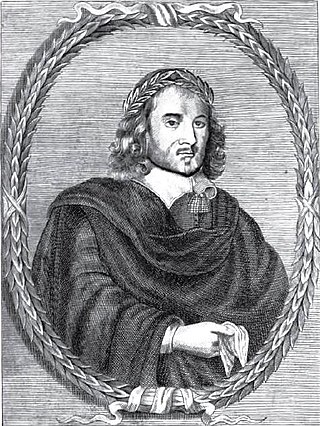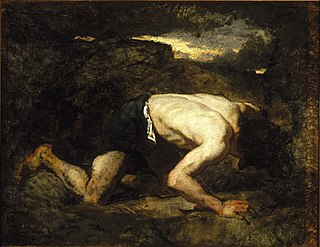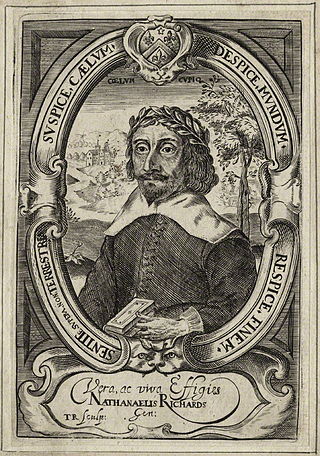
William Shakespeare was an English playwright, poet and actor. He is widely regarded as the greatest writer in the English language and the world's pre-eminent dramatist. He is often called England's national poet and the "Bard of Avon". His extant works, including collaborations, consist of some 39 plays, 154 sonnets, three long narrative poems, and a few other verses, some of uncertain authorship. His plays have been translated into every major living language and are performed more often than those of any other playwright. Shakespeare remains arguably the most influential writer in the English language, and his works continue to be studied and reinterpreted.

Thomas Middleton was an English Jacobean playwright and poet. He, with John Fletcher and Ben Jonson, was among the most successful and prolific of playwrights at work in the Jacobean period, and among the few to gain equal success in comedy and tragedy. He was also a prolific writer of masques and pageants.

The Raigne of King Edward the Third, commonly shortened to Edward III, is an Elizabethan play printed anonymously in 1596, and at least partly written by William Shakespeare. It began to be included in publications of the complete works of Shakespeare only in the late 1990s. Scholars who have supported this attribution include Jonathan Bate, Edward Capell, Eliot Slater, Eric Sams, Giorgio Melchiori and Brian Vickers. The play's co-author remains the subject of debate: suggestions have included Thomas Kyd, Christopher Marlowe, Michael Drayton, Thomas Nashe and George Peele.
This article contains information about the literary events and publications of 1604.
The History of Cardenio, often referred to as simply Cardenio, is a lost play, known to have been performed by the King's Men, a London theatre company, in 1613. The play is attributed to William Shakespeare and John Fletcher in a Stationers' Register entry of 1653. The content of the play is not known, but it was likely to have been based on an episode in Miguel de Cervantes's Don Quixote involving the character Cardenio, a young man who has been driven mad and lives in the Sierra Morena. Thomas Shelton's translation of the First Part of Don Quixote was published in 1612 and would thus have been available to the presumed authors of the play.
George Wilkins was an English dramatist and pamphleteer best known for his probable collaboration with William Shakespeare on the play Pericles, Prince of Tyre. By profession he was an inn-keeper, but he was also apparently involved in criminal activities.

This article presents a possible chronological listing of the composition of the plays of William Shakespeare.

Timon of Athens is a play written by William Shakespeare and probably also Thomas Middleton in about 1606. It was published in the First Folio in 1623. Timon lavishes his wealth on parasitic companions until he is poor and rejected by them. He then denounces all of mankind, and isolates himself in a cave in the wilderness.

The Shakespeare apocrypha is a group of plays and poems that have sometimes been attributed to William Shakespeare, but whose attribution is questionable for various reasons. The issue is not to be confused with the debate on Shakespearean authorship, which questions the authorship of the works traditionally attributed to Shakespeare.

A Yorkshire Tragedy is an early Jacobean era stage play, a domestic tragedy printed in 1608. The play was originally assigned to William Shakespeare, though the modern critical consensus rejects this attribution, favouring Thomas Middleton.

Shakespeare's plays are a canon of approximately 39 dramatic works written by English poet, playwright, and actor William Shakespeare. The exact number of plays as well as their classifications as tragedy, history, comedy, or otherwise is a matter of scholarly debate. Shakespeare's plays are widely regarded as being among the greatest in the English language and are continually performed around the world. The plays have been translated into every major living language.
Like most playwrights of his period, William Shakespeare did not always write alone. A number of his surviving plays are collaborative, or were revised by others after their original composition, although the exact number is open to debate. Some of the following attributions, such as The Two Noble Kinsmen, have well-attested contemporary documentation; others, such as Titus Andronicus, are dependent on linguistic analysis by modern scholars; recent work on computer analysis of textual style has given reason to believe that parts of some of the plays ascribed to Shakespeare are actually by other writers.
Microcynicon: Six Snarling Satires is a work of poetic satire written by English playwright Thomas Middleton in 1597 and 1598. The print version was published in 1599 by Thomas Creede for Thomas Bushell and was burned publicly as part of the Archbishop of Canterbury's attack on verse satire; it was not reprinted again in the seventeenth century. Although a minor work, the poems included prefigure the interests of Middleton's mature work in sin, hypocrisy, and lust. The poem was influenced by works by John Marston and Joseph Hall, and has been described as one of Middleton's "masterpieces".
The Spanish Gypsy is an English Jacobean tragicomedy, dating from around 1623. The play was likely a collaboration between several dramatists, including Thomas Middleton, William Rowley, Thomas Dekker, and John Ford. Like Shakespeare's lost play Cardenio, The Spanish Gypsy is an English reworking of the novellas of Miguel de Cervantes, combining two of Cervantes' Novelas Ejemplares into a single drama.
The Beaumont and Fletcher folios are two large folio collections of the stage plays of John Fletcher and his collaborators. The first was issued in 1647, and the second in 1679. The two collections were important in preserving many works of English Renaissance drama.

The Oxford Shakespeare is the range of editions of William Shakespeare's works produced by Oxford University Press. The Oxford Shakespeare is produced under the general editorship of Stanley Wells and Gary Taylor.
MacDonald Pairman Jackson FNZAH is a New Zealand scholar of English literature. Most of his work is on English Renaissance drama; he specialises in authorship attribution. He is also internationally recognised for his work on Shakespeare's texts.

Shakespeare attribution studies is the scholarly attempt to determine the authorial boundaries of the William Shakespeare canon, the extent of his possible collaborative works, and the identity of his collaborators. The studies, which began in the late 17th century, are based on the axiom that every writer has a unique, measurable style that can be discriminated from that of other writers using techniques of textual criticism originally developed for biblical and classical studies. The studies include the assessment of different types of evidence, generally classified as internal, external, and stylistic, of which all are further categorised as traditional and non-traditional.
John D. Jowett is an English Shakespeare scholar and editor. He is the Professor of Shakespeare Studies at the University of Birmingham and Deputy Director of the Shakespeare Institute.

Nathanael Richards was an English dramatist and poet, perhaps from Kent. He should not be confused with Nathaniel Richards (1611–1660), a cleric.










